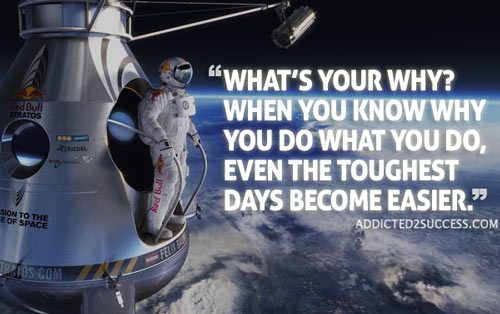Life
How To Stay Resilient In The Face Of Adversity

The average person would rather be comfortable than be challenged. They have big dreams and big wishes, but are reluctant to sacrifice their comfort in order to make those dreams come true.
They might put in a little effort here and there, but when they’re faced with an obstacle, a setback, or a challenging situation, they pull back instead of push forward. Consequently, their dreams remain dreams, and their reality remains unchanged.
Resilience is required for success
Resilience is an essential quality to succeeding in any industry or endeavor. For every goal that you have, there are likely thousands of other people who have that same goal. Do you want your music to be played on the radio? Great. Thousands of other artists are also trying to get their music played on the radio as well. Is your goal to become a professional speaker? Great. Thousands of others are also trying to succeed as professional speakers. Is your goal to become a professional athlete? Fantastic. So are thousands of other people. The point is that no matter what you do, you will have competition. Often it is those who are the most resilient who surpass their competition and achieve their goals.
“In the middle of difficulty lies opportunity.” – Albert Einstein
Don’t let challenges stop you from moving forward
So what is resilience? Resilience is your ability to keep moving forward in spite of challenges, rejection, setbacks, obstacles, and disappointments. Resilience is your ability to maintain a positive attitude and remain optimistic when you have every reason not to be. Resilience means you don’t give up on your goals when they become difficult to achieve (and the bigger the goal, the greater the difficulty). Successful people are resilient. The average person is not.
The way to become more resilient is to have strong internal motivators. Motivators are reasons why you want to accomplish what you have set out to accomplish. Most people who say they want something –a new house, a luxury car, or a promotion, for example – are not clear on why they want it. Because they’re not clear, and because worthwhile goals are seldom achieved easily, they are unable to convince themselves why they should persist when the journey becomes difficult.
“Don’t wish it were easier. Wish you were better.” – Jim Rohn
Take control of the thoughts in your mind
Successful people understand the power of the mind. They know that when we are faced with a challenge, our mind demands an explanation. The human mind is hardwired to protect the body from harm and discomfort. This is why we instinctively pull our arm back when we touch a hot stove or cover our face when someone unexpectedly throws a ball at us. Our instincts tell us to protect ourselves.
Unfortunately those instincts can work against us when we are facing challenges. Challenges make us uncomfortable, which triggers our mind’s desire to avoid that discomfort. Unless we have a clear explanation for our discomfort (a motivator or a reason why), our mind will try to convince us to quit so that we can go back to being comfortable.

Comfort is the enemy of success
Whether your goal is to buy a house, become a professional athlete, earn a promotion, start a business, become financially free, raise a family, or perhaps finish a university degree, you will undoubtedly experience setbacks, roadblocks, detours, and obstacles along the way. You must be prepared for the challenges that will come your way.
No one becomes successful because they find an easy path. They become successful because they decide what they want, they go after it, and when obstacles arise they don’t quit or change directions. They find a way to overcome those obstacles and keep going. In order to master your craft and become one of the best in your field, you must be prepared to endure challenges. You must be resilient.
How has being resilient helped you succeed?
Did You Know
How Skilled Migrants Are Building Successful Careers After Moving Countries
Behind every successful skilled migrant career is a mix of resilience, strategy, and navigating systems built for locals.

Moving to a new country for work is exciting, but it can also be unnerving. Skilled migrants leave behind familiar systems, networks, and support to pursue better job opportunities and a better future for their families. (more…)
Life
10 Research-Backed Steps to Create Real Change This New Year
This New Year could finally be the one where you break old patterns and create real, lasting change.

Every New Year, we make plans and set goals, but often repeat old patterns. (more…)
Life
9 Harsh Truths Every Young Man Must Face to Succeed in the Modern World
Before chasing success, every young man needs to face these 9 brutal realities shaping masculinity in the modern world.

Many young men today quietly battle depression, loneliness, and a sense of confusion about who they’re meant to be.
Some blame the lack of deep friendships or romantic relationships. Others feel lost in a digital world that often labels traditional masculinity as “toxic.”
But the truth is this: becoming a man in the modern age takes more than just surviving. It takes resilience, direction, and a willingness to grow even when no one’s watching.
Success doesn’t arrive by accident or luck. It’s built on discipline, sacrifice, and consistency.
Here are 9 harsh truths every young man should know if he wants to thrive, not just survive, in the digital age.
1. Never Use Your Illness as an Excuse
As Dr. Jordan B. Peterson often says, successful people don’t complain; they act.
Your illness, hardship, or struggle shouldn’t define your limits; it should define your motivation. Rest when you must, but always get back up and keep building your dreams. Motivation doesn’t appear magically. It comes after you take action.
Here are five key lessons I’ve learned from Dr. Peterson:
-
Learn to write clearly; clarity of thought makes you dangerous.
-
Read quality literature in your free time.
-
Nurture a strong relationship with your family.
-
Share your ideas publicly; your voice matters.
-
Become a “monster”, powerful, but disciplined enough to control it.
The best leaders and thinkers are grounded. They welcome criticism, adapt quickly, and keep moving forward no matter what.
2. You Can’t Please Everyone And That’s Okay
You don’t need a crowd of people to feel fulfilled. You need a few friends who genuinely accept you for who you are.
If your circle doesn’t bring out your best, it’s okay to walk away. Solitude can be a powerful teacher. It gives you space to understand what you truly want from life. Remember, successful men aren’t people-pleasers; they’re purpose-driven.
3. You Can Control the Process, Not the Outcome
Especially in creative work, writing, business, or content creation, you control effort, not results.
You might publish two articles a day, but you can’t dictate which one will go viral. Focus on mastery, not metrics. Many great writers toiled for years in obscurity before anyone noticed them. Rejection, criticism, and indifference are all part of the path.
The best creators focus on storytelling, not applause.
4. Rejection Is Never Personal
Rejection doesn’t mean you’re unworthy. It simply means your offer, idea, or timing didn’t align.
Every successful person has faced rejection repeatedly. What separates them is persistence and perspective. They see rejection as feedback, not failure. The faster you learn that truth, the faster you’ll grow.
5. Women Value Comfort and Security
Understanding women requires maturity and empathy.
Through books, lectures, and personal growth, I’ve learned that most women desire a man who is grounded, intelligent, confident, emotionally stable, and consistent. Some want humor, others intellect, but nearly all want to feel safe and supported.
Instead of chasing attention, work on self-improvement. Build competence and confidence, and the rest will follow naturally.
6. There’s No Such Thing as Failure, Only Lessons
A powerful lesson from Neuro-Linguistic Programming: failure only exists when you stop trying.
Every mistake brings data. Every setback builds wisdom. The most successful men aren’t fearless. They’ve simply learned to act despite fear.
Be proud of your scars. They’re proof you were brave enough to try.
7. Public Speaking Is an Art Form
Public speaking is one of the most valuable and underrated skills a man can master.
It’s not about perfection; it’s about connection. The best speakers tell stories, inspire confidence, and make people feel seen. They research deeply, speak honestly, and practice relentlessly.
If you can speak well, you can lead, sell, teach, and inspire. Start small, practice at work, in class, or even in front of a mirror, and watch your confidence skyrocket.
8. Teaching Is Leadership in Disguise
Great teachers are not just knowledgeable. They’re brave, compassionate, and disciplined.
Teaching forces you to articulate what you know, and in doing so, you master it at a deeper level. Whether you’re mentoring a peer, leading a team, or sharing insights online, teaching refines your purpose.
Lifelong learners become lifelong leaders.
9. Study Human Nature to Achieve Your Dreams
One of the toughest lessons to accept: most people are self-interested.
That’s not cynicism, it’s human nature. Understanding this helps you navigate relationships, business, and communication more effectively.
Everyone has a darker side, but successful people learn to channel theirs productively into discipline, creativity, and drive.
Psychology isn’t just theory; it’s a toolkit. Learn how people think, act, and decide, and you’ll know how to lead them, influence them, and even understand yourself better.
Final Thoughts
The digital age offers endless opportunities, but only to those who are willing to take responsibility, confront discomfort, and keep improving.
Becoming a man today means embracing the hard truths most avoid.
Because at the end of the day, success isn’t about luck. It’s about who you become when life tests you the most.
Change Your Mindset
The Four Types of Happiness: Which One Are You Living In?
Most people chase success only to find emptiness, this model reveals why true happiness lies somewhere else.

In a world driven by rapid technological growth and constant competition, many people unknowingly trade joy for achievement. (more…)
-

 News3 weeks ago
News3 weeks agoBrandon Willington Builds 7-Figure Business by Ignoring Almost Everything
-

 Health & Fitness4 weeks ago
Health & Fitness4 weeks agoWhat Minimalism Actually Means for Your Wellness Choices
-

 Did You Know3 weeks ago
Did You Know3 weeks agoWhy Most Online Courses Fail and How to Fix Them
-

 Business3 weeks ago
Business3 weeks agoIf Your Business Internet Keeps Letting You Down, Read This
-

 Business2 weeks ago
Business2 weeks agoEntrepreneur’s Guide to Pay Stubs: Why Freelancers and Small Business Owners Need a Smart Generator
-

 Business1 week ago
Business1 week agoThe Salary Shift Giving UK Employers An Unexpected Edge
-

 Business2 weeks ago
Business2 weeks agoThe Simple Security Stack Every Online Business Needs
-

 Scale Your Business2 weeks ago
Scale Your Business2 weeks ago5 Real Ways to Grow Your User Base Fast






























1 Comment